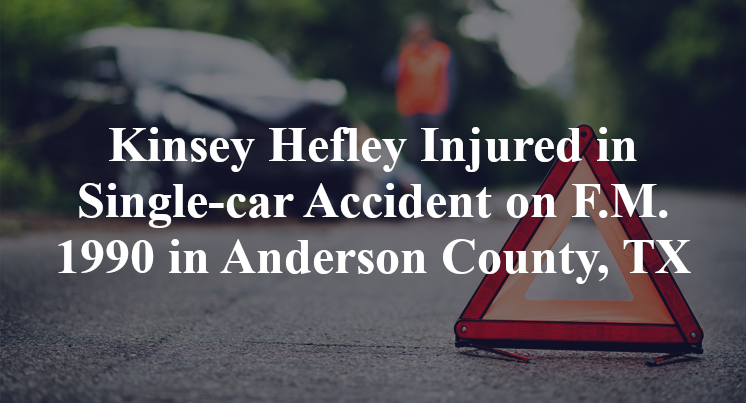Kinsey Hefley Injured in Single-car Accident on F.M. 1990 in Anderson County, TX
Palestine, TX — May 16, 2025, Kinsey Hefley was injured in a single-car accident shortly after 10:45 p.m. along Farm to Market 1990.
According to authorities, 26-year-old Kinsey Hefley was traveling in a southwest bound Honda Accord on F.M. 1990 in the vicinity of the C.R. 2140 intersection when the accident took place.

Officials indicate that, for reasons yet to be confirmed, the Accord was involved in a single-vehicle collision in which it apparently struck a tree and overturned. Hefley reportedly sustained serious injuries over the course of the accident. Additional details pertaining to this incident are not available at this point in time. The investigation is currently ongoing.
Commentary
After a crash like this, the first thought most people have is that the driver must have made a mistake. But when a car leaves the road, hits a tree, and overturns—especially late at night—there are often deeper factors at play. From my experience, getting to the bottom of a single-vehicle crash like this means asking the right questions, not just taking the surface details at face value.
First, did the authorities thoroughly investigate the crash? Farm to Market roads like FM 1990 can be challenging to drive at night. Was the road properly lit, and were there clear lane markings? Was there a sharp curve, loose gravel, or other conditions that could cause a driver to lose control? These are questions that can make a big difference in understanding what led to the vehicle leaving the roadway. I’d also want to know whether investigators looked at tire tracks or vehicle positioning to see if the driver made any attempt to steer away from the hazard.
Next, has anyone looked into the possibility that a vehicle defect caused the crash? A Honda Accord is generally reliable, but no vehicle is immune to mechanical failure. A sudden brake malfunction, steering issue, or tire blowout could all cause the driver to lose control—especially on a rural road at night. Newer vehicles also have electronic systems that, if they fail, can impact how the car responds. A thorough inspection of the car could reveal whether something went wrong mechanically or electronically before the crash.
Finally, has all the electronic data relating to the crash been collected? Modern vehicles store a wealth of data about what happened in the seconds before a crash—speed, steering input, brake use, and more. That kind of data can confirm whether the driver tried to react, or if the vehicle behaved unexpectedly. If nearby homes or businesses have security cameras, that footage could help show how the car was moving before it went off the road. Without this kind of evidence, critical pieces of the puzzle can be missed.
In cases like this, it’s not enough to guess or assume. When someone is seriously hurt, finding out exactly what happened requires a full, careful investigation. That starts with asking questions that push beyond what’s obvious—and often leads to answers that can prevent future accidents.
Takeaways:
- Road conditions and visibility should be closely reviewed when a vehicle leaves the road at night on a rural route.
- Mechanical or electronic defects—especially in steering, brakes, or tires—should be considered in single-vehicle crashes.
- Onboard vehicle data and any nearby surveillance footage may provide essential insight into the crash sequence.

*We appreciate your feedback and welcome anyone to comment on our blog entries, however all visitor blog comments must be approved by the site moderator prior to showing live on the site. By submitting a blog comment you acknowledge that your post may appear live on the site for any visitors to see, pending moderator approval. The operators of this site are not responsible for the accuracy or content of the comments made by site visitors. By submitting a comment, blog post, or email to this site you acknowledge that you may receive a response with regard to your questions or concerns. If you contact Grossman Law Offices using this online form, your message will not create an attorney-client relationship and will not necessarily be treated as privileged or confidential! You should not send sensitive or confidential information via the Internet. Since the Internet is not necessarily a secure environment, it is not possible to ensure that your message sent via the Internet might be kept secure and confidential. When you fill out a contact or comment form, send us an email directly, initiate a chat session or call us, you acknowledge we may use your contact information to communicate with you in the future for marketing purposes, but such marketing will always be done in an ethical way.